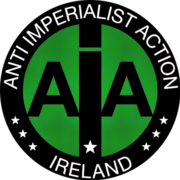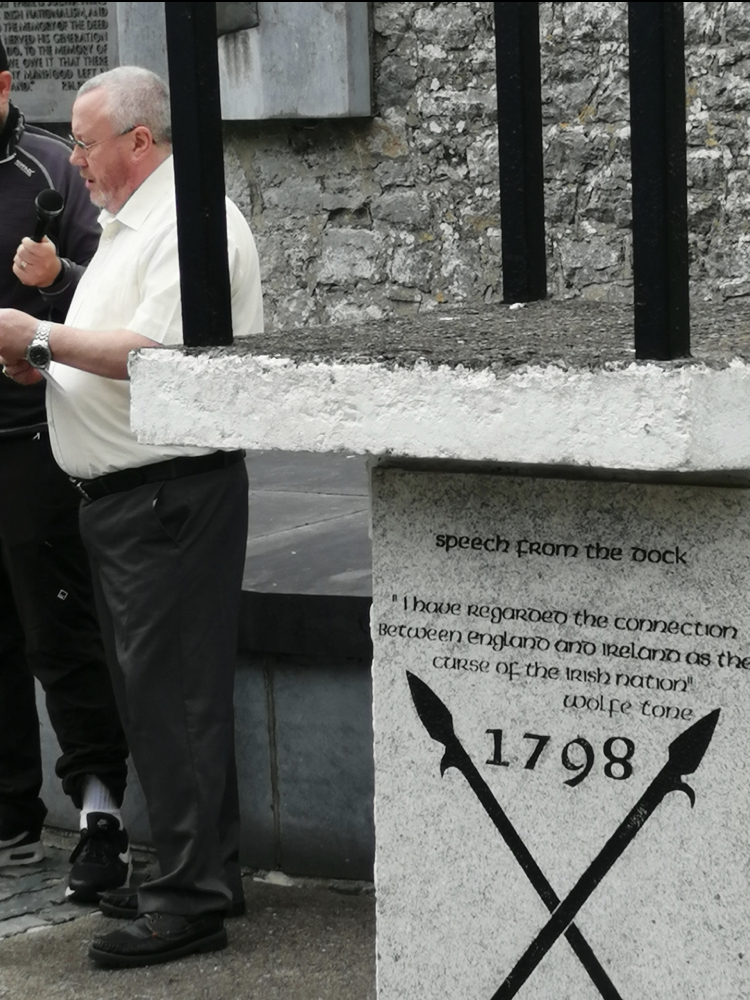The historian, author and Independent Republican Activist, Peter A. Rogers was a guest speaker at the recent Bodenstown commemoration, speaking on behalf of the Spirit of Irish Freedom Society, Westmeath. Peter gave an insightful oration, outlining the importance of Bodenstown to Revolutionary Irish Republicans and also highlighted some of the key speakers at the event over the years.
A chairde,
Today I’m going to speak to you all about Bodenstown and what the grave of Wolfe Tone means to Republicans.
Republicans recognise Bodenstown as the last resting place of the architect of our vision for Ireland, the man where it all began. Theobald Wolfe Tone is known to us all as the Father of Irish Republicanism, which is a very accurate description of this gallant Irish patriot. We stand here today in honour of him and his great ideal, an Irish People’s Republic.
Throughout the history of our country’s foreign occupation, since the Normans arrived in 1169, almost every generation of Irish people has endeavoured to overcome the English invader to take back control of our country.
All attempts in this regard before 1700 could really be described as sporadic personalised actions, initiated by Irish Chieftains struggling to regain their lands from English Lords, as the old Irish Clan system remained in place up until the mid-1600’s.
I don’t want to denigrate these actions in any way because going to war is no small undertaking regardless of your social status in society, but the facts are, these uprisings were of a localised nature which escalated further because other Irish chiefs, who also felt aggrieved, joined in the fight.
We must also be aware that if any of these wars, during this period, had been successful in driving out the English, Ireland would almost certainly have returned to having an Irish monarch instead of an English one. For instance, if Tyrone’s Hugh O’Neill had been successful at the battle of Kinsale in 1601, he would certainly have placed himself on the Irish throne as its one and only King.
Immediately after the failure of Owen Roe O’Neill’s Irish Confederacy in the war of 1647, the English were determined to complete the total destruction of any semblance of the old Irish Clan order in an attempt to finally end resistance to English rule in Ireland.
With the old Irish clan system dismantled, it wasn’t until the revolutionary uprising in 1798 that Irish Republicanism, as we know it today, was born. In 1791 Wolfe Tone and his comrades, Napper Tandy and Thomas Russell established the Society of the United Irishmen. These men were greatly influenced by the actions of the new Revolutionary Republican Movements who had come to power in both America and in France.
The aim of Wolfe Tone’s United Irishmen was to be a grassroots movement of the people, not one led purely by the higher echelons of Irish society. They envisaged a movement that could unite all Irish people under one banner. A military force capable of striking a fatal blow against the Crown to finally break the connection with England and establish a similar type of people’s Republic in Ireland.
Although 1798 failed, the aims and ideals of creating such a people’s Republic took root and continued to guide future Irish generations into further revolutionary actions to gain freedom. The inspiration for those future Republican organisations came directly from what Wolfe Tone achieved in 1798 by uniting Catholic, Protestant and dissenter to fight together against a common enemy.
Republicans ever since have believed the influence of Wolfe Tone to be paramount in creating an appetite among the Irish people to establish such a Republic. Republicans have strived to emulate his model ever since.
Following the death of Wolfe Tone, it wasn’t until 1829 that members of the Young Irelanders began to attend Bodenstown. Thomas Davis made contact with Wolfe Tone’s widow, Matilda, and received her blessing to organise a commemoration in his honour. This appears to have been the first of its kind here at Bodenstown. The first Republican Memorial is known to have been erected here at the burial site in 1843.
With the failure of the Young Irelanders, there was a decade of very little activity throughout the 1850’s, but the new Fenian Movement began to hold events again in the early 1860’s to encourage recruitment into its organisation.
Thirty years after the first memorial had been installed, a local Wolfe Tone Band was responsible for erecting a new monument here in 1873. It too was replaced in 1895 by the local GAA club. Its refurbishment became necessary due to the visitors chipping off small pieces of the gravestone to bring home as souvenirs.
Regular annual commemorations really gathered pace from 1877 onwards, when members of the IRB began to promote the event with prominent Republican leaders as guest speakers. The great labour leader James Connolly spoke here on the centenary of the United Irishmen’s uprising in 1898. Another notable speaker was Pádraig Pearse in 1913. As part of Pearse’s speech he stated that Bodenstown was “the most holy place in Ireland”.
In the run-up to the Easter Rising, Tom Clarke was the guest speaker in 1915, he too blurted out a signal to all present that something was stirring within Irish militant Republicanism. Clarke stated, “the rifle is talking the world over today and it is going to talk in Ireland too”.
Another important Republican speaker we must remember today is Liam Mellows. He spoke here on 20th June 1922, just eight days before the treacherous Free State launched its attack on the Republican forces in the Four Courts, which led to the war in defence of the Republic.
Another interesting incident to recollect was the attendance of some socialist minded groups from Protestant districts of Belfast in 1934. These groups had been invited to attend the Republican Movement’s annual event but unfortunately the day ended in chaos. Although it has never been repeated, Republicans can never close the door on such a presence in the future.
Moving forward to 1970, as a young lad I was present here with my late father to hear Dáithí Ó Conaill’s first Bodenstown address on behalf of the newly formed Provisional Movement. His whole speech was addressed to the British government on how they could leave Ireland peacefully and in an orderly fashion.
I have attended many events here in Bodenstown, over the years, but in recent times one of the most brilliant speeches I have had the privilege to hear, was one from former United States Marine and Provisional IRA Volunteer, John Crawley, who addressed an event, about six years ago, organised by the 1916 Societies.
It’s extremely important that Irish Republicans look to the past in order to find our path to the future.
Republicans will always see Wolfe Tone’s burial site as a place of pilgrimage, it has become an integral part of our journey to achieve our ultimate aim, complete independence and a Democratic Socialist Republic.
Republicans also see this “Holy Place” as educational, a place where we can congregate to learn from the wise words spoken by many great Republican patrons.
Finally, Republicans see Bodenstown as a place of sanctuary, a place where our great leader can rest safely in the notion, that his dream is also our dream and it’s now our responsibility to make that dream a reality by whatever means necessary.
Thank you all for listening. Go raibh maith agaibh go leir.

